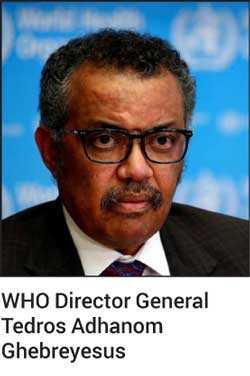Monday Feb 16, 2026
Monday Feb 16, 2026
Saturday, 2 May 2020 01:49 - - {{hitsCtrl.values.hits}}
 GENEVA/LONDON (Reuters): Tedros Adhanom Ghebreyesus gave a robust defence on Friday of his and the World Health Organisation's (WHO) "timely" actions in declaring COVID-19 an international health emergency at the end of January.
GENEVA/LONDON (Reuters): Tedros Adhanom Ghebreyesus gave a robust defence on Friday of his and the World Health Organisation's (WHO) "timely" actions in declaring COVID-19 an international health emergency at the end of January.
The 30 January declaration was made in "enough time for the rest of the world to respond" because there were, at that stage, only 82 cases of infection and no deaths outside China, Tedros told a virtual media briefing at the WHO's Geneva headquarters.
Tedros said the WHO, which is seeking to lead the global response to the COVID-19 pandemic, had used the days before declaring the global emergency as time to visit China to learn more about the new virus.
During that visit, they also won a "ground-breaking agreement" with China to send in investigators, Tedros said.
Tedros, asked about relations with the United States — its biggest donor — which has suspended funding after criticising WHO's handling of the pandemic, said: "We are actually in constant contact and we work together."
Confirming that the COVID-19 pandemic is clearly still a global health emergency, Tedros said he had "grave concerns about the potential impact" of the disease "as it starts to accelerate in countries with weaker health systems".
The WHO's Head of Emergencies Mike Ryan said the agency was seeing worrying increases in cases of COVID-19 in Haiti, Somalia, Sudan, South Sudan, Yemen, Syria, Afghanistan, Sierra Leone, and northern Nigeria.
Ryan also said that while the WHO recognised that some countries are beginning to consider easing lockdown measures, it was important that they are "constantly on the lookout for a jump in infections" and should be ready to put some measures back in place if needed.
Tedros said the WHO would "continue working with countries and partners to enable essential travel needed for pandemic response, humanitarian relief and cargo operations, and for countries to gradually resume normal passenger travel".
"As we have done clearly from the beginning, we will continue to call on countries to implement a comprehensive package of measures to find, isolate, test and treat every case, and trace every contact," he said.